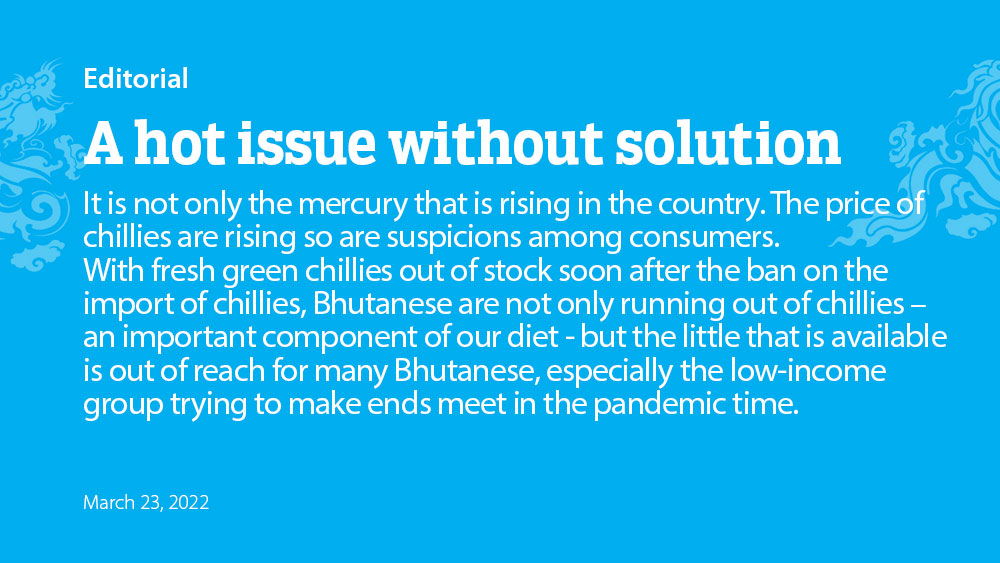It is not only the mercury that is rising in the country. The price of chillies are rising so are suspicions among consumers.
With fresh green chillies out of stock soon after the ban on the import of chillies, Bhutanese are not only running out of chillies – an important component of our diet – but the little that is available is out of reach for many Bhutanese, especially the low-income group trying to make ends meet in the pandemic time.
Chillies imported from India was banned because of high content of pesticide residue, proven harmful for consumers. The government is so considerate. They care for the health of the people. Banning import of contaminated food items is the right decision. Chilli is an integral part of our diet. What is considered a spice is a vegetable here in the country. It is easy to cook, delicious and an easy cheap dish. When a kilogram of chillies cost a day’s wage or more, it is a more severe problem – for some, than the omicron variant of the virus.
If we (Bhutanese farmers) can meet the demand with healthier or cleaner chillies, there is nothing like it. We have to promote agriculture. If farmers and growing numbers of youth returning to the villages can find a good market and provide a substitute, many Bhutanese will not mind paying a higher price.
This, unfortunately, is not happening.
The so-called local chillies are not local. They are the ones that escaped the eyes of BAFRA officials and others who monitor import of food products. If we are paying Nu 600 for a kilogram of chillies that are smuggled in and sold as local chillies, it is a double-edged sword. It is expensive and unhealthy to consume.
Our farmers know how impossible it is to grow winter vegetables. Chilli is a summer crop. Even with improved agriculture technology, they know that it is too early for local chillies to hit the market on a commercial scale. A visit to the popular chilli farms in the warmer places is evident that we had been taking consumers for a ride.
The chilli plants are at the stage of flowering in most of the so-called chilli growing regions. Agriculture extension officers said that the first harvests will hit the market in the next few days or weeks. Farmers and agriculture experts are trying out hybrid species to offset the demand in winter. But there is not much success. What is grown is not enough. Dagana banned the import of chillies, but what they grew was not enough to meet the demand.
In the meantime, farmers said without using “chemical” it would be difficult to grow crops that are not suited because of climatic conditions. Pesticide is one. Resorting to artificial or unnatural methods may help farmers grow chillies in winter, but the main reason for banning import is because of the contamination from chemicals, especially pesticides. Are we even checking how contaminated the locally produced chillies or vegetables are?
The problem of chilli will remain as long as it remains the favourite “vegetable” in the country. It will be forgotten as the temperature increases and local chillies hit the market. We will forget the issue as the price drops. The problem will surface next winter, we will import, complain and then start the cycle all over again. Nobody seems to have a solution.


